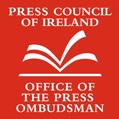 The Press Ombudsman and Press Council seem to be shaping up to try to hit the ground running in the new year. For example, Mark Hennessy in the Irish Times (sub req’d) recently reported that the Press Council will accept complaints from the public from 1 January 2008 about any articles published since 1 October last. However, Ronan McGreevy in the Irish Times (sub req’d) subsequently reported (also here) that meeting of the Press Council will take place next month, at which a decision will be taken as to when it will start taking complaints from the public, but the aim is still for 1 January.
The Press Ombudsman and Press Council seem to be shaping up to try to hit the ground running in the new year. For example, Mark Hennessy in the Irish Times (sub req’d) recently reported that the Press Council will accept complaints from the public from 1 January 2008 about any articles published since 1 October last. However, Ronan McGreevy in the Irish Times (sub req’d) subsequently reported (also here) that meeting of the Press Council will take place next month, at which a decision will be taken as to when it will start taking complaints from the public, but the aim is still for 1 January.
It is still unclear whether the Defamation Bill, 2006 will be law before the new year, but the Press Council would like it to be, so that it would attract qualified privilege, as provided for in ss14-18 of Schedule 1 to the Bill. Whilst that would give the Press Council some comfort, it shouldn’t be necessary, as complaints to it would qualify for qualified privilege on existing common law principles anyway.
Moreover, McGreevy reported that the recently-appointed Press Ombudsman, Prof John Horgan, takes the view that standards in Irish journalism are already good. In his first formal policy statement (pdf) since his appointment in August, addressing the National Union of Journalists‘ biennial delegate conference (see Blurred Keys here and here) last week in Tullamore, Co Offaly Prof Horgan stressed that his office’s independence is one of its greatest strengths. And he argued that
the aim of this new structure is neither blame nor revenge. We are neither policemen nor judges, and do not seek their powers. Nor are we ambulance chasers. The two simple objectives to which we are dedicated – redress for the public, and the defence of the freedom of the press – can readily be achieved without coercion, and are in no way opposed to each other.
He stressed that “good tabloid journalism is as vital to the health of our democratic system as good broadsheet journalism”, and that he was not appointed “in the words of a comment in one of our distinguished contemporaries, as someone who would be ‘putting manners on tabloid behaviour’.” Instead, he said that his role will be
to examine all valid complaints against the press rapidly and fairly. We will conciliate where we can, and issue decisions only in cases where it is impossible to reach agreement on a resolution of the issue between reader and newspaper..
And he concluded:
that trust and authority are hard-won attributes of media; that effective self-regulation is a vital instrument in the maintenance of these key attributes; that trust, once lost, is often difficult to regain; and that the maintenance and development of appropriate professional standards is a continuing task for journalists themselves as much as for the Press Council and the Ombudsman.
But the Press Council and Press Ombudsman should not be complacent. The experience of the Press Complaints Commission (PCC) in the UK has been one of controversy, though its current Chairman, Sir Christopher Meyer (PCC | wikipedia), said in an interview in The Guardian (hat tip: MediaPal@LSE), believes that there has been a sea change in the attitude towards newspaper regulation since he became chair in 2003, in part because the PCC had been seen to be acting quickly and decisively. And he said that the tide is turning in celebrity cases towards the discretion of the PCC and away from adversarial court battles:
They [the public] see Naomi Campbell and Lord Browne. They see costs going on endlessly and the very thing they’re trying to protect is dragged out in open court and reported everywhere.
And he concluded:
What I would like to be able to say when I leave here is that we have so evolved that self-regulation is beyond all question and all doubt the way to go, that the code of practice is a gold standard for upholding high-quality journalism, and that we are known throughout the length and breadth of the land as being the place to come to if you have a problem with journalism.
I hope that the Press Council and Press Ombudsman will soon be able to say the same thing.
Hi, I’m a bit lost on this subject, as the Press Council is up and running since the 1st of January, does that mean the defamation Bill 2006 has become law or is it still being considered in the Seanad!?